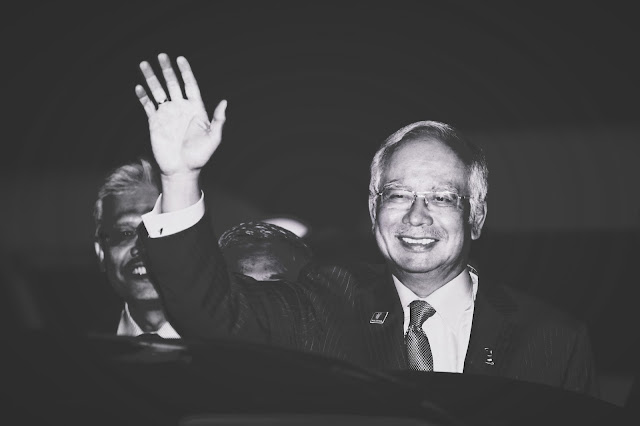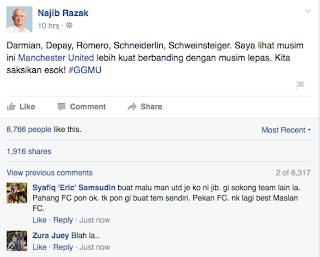Thousands of Malaysian netizens have declared war on their leader through Facebook and Instagram.
EDITOR’S NOTE: As we write, thousands of comments are being deleted, and users may possibly have been banned from posting comments on Najib’s Facebook account. It appears Najib has gone on war against his virtual dissidents — and he appears to have been backed by an army of cybertroopers, although it is still impossible to ascertain the amount of comments he is receiving. Negative comments continue to flood his Instagram account, however.
Since the beginning of the saga plaguing the sovereign 1MDB fund, foreign and local analysts said it had an undeniable impact on the economy but also generally agreed that it was not systemic.
However, there is a much larger fallout of the 1MDB scandal that experts overlooked and it is the political ramifications it brought with it and the stirring social implications it has triggered.
Rocked by a lingering political shakeup, the country saw a series of police actions that did not sit well with the anti-corruption agency, the MACC.
The opposition parties were angered with the arrests and questioning of ‘suspects’ in what is now called a whistle-blower witch hunt.
The ruling Umno, Malay-Muslim party, is showing signs of strain and acute division amid a series of defiance from grassroots members and leaders within the Umno stronghold state of Johor.
There is a lot of grumbling among the population, with many spilling their beans on social networks ranging from Facebook to Twitter and Instagram.
Snapshots of comments made on the Malaysian Prime Minister's Facebook or Instagram accounts give us an example of the mood of the population, at least those who are online, and this cannot be discounted as flimsy.
In one of his latest postings on Facebook, the Malaysian premier was full of praise of the Premier League team Manchester United for its new recruits, saying he sees the former English champions as a stronger team this season.
Darmian, Depay, Romero, Schneiderlin, Schweinsteiger. Saya lihat musim ini Manchester United lebih kuat berbanding dengan musim lepas. Kita saksikan esok! #GGMU. (I view Manchester United this season as stronger than it was stronger last season. Let’s see tomorrow!)
The immediate responses seen on the page tell a tale of the tallest order in the erosion of etiquette in the country’s social media scene.
A Facebook account holder replied “buat malu man utd je ko ni jib. gi sokong team lain la. Pahang FC pon ok. tk pon gi buat tem sendiri. Pekan FC. nk lagi best Maslan FC”
Translated in English, it says that the Prime Minister brought shame to Manchester United, and urged him to support other teams than the legendary Man Utd. The commentary went on to suggest the PM should support the state of Pahang FC, in Pahang where Najib is the Member of Parliament.
“Or you can create your own team. Pekan FC, or Maslan FC,” in a sarcastic twist referring to what the Internet users refers the most hated minister of all time, Ahmad Maslan for his pro-Goods and Services Tax (GST) antics.
Another irate Facebook account holder simply wrote: Get Lost, referring to the PM, while another said the Prime Minister should be worried about the hardship the people is going through rather than posting stuffs about soccer.
Others asked users to post as much as they could on Najib Razak’s Facebook page in order for the Malaysian Premier to be aware of his dwindling popularity and the low esteem they had in his leadership.
It is all written on his Facebook wall, and this may have triggered the newly appointed Minister of Communications Keruak to propose amendments to the Communications laws in the country, that would see a dramatic change in the way things are said and done on social media.
Claiming the amendments will not target social media users, the minister said there was a need to change the laws in order to ensure that news portals did not indulge in fake reporting.
And this, in itself will be a game changer in a country where the entire population relies on internet portals to seek alternate news and views, which are somewhat one sided with the government controlled media.
The disruptive percentage contributed by the 1MDB scandal and the subsequent revelation of the cash-stash in the PM’s personal account in Malaysia and the silence from the corridors of power, could have accentuated the social media’s users condemnation of the ruling politicians.
All in all, the propaganda machinery of the Barisan National (BN) and of the Umno (the party’s information chief is Ahmad Maslan), failed to contain the avalanche of backlash, resulting in the center of power taking drastic measures in an attempt to regain public’s confidence.
How is this working for the government and the Prime Minister?
It appears that the 1MDB situation has caused even more damages than the 2013 elections which showed the slide in popularity for the BN while the opposition won the popularity contest with 52+ odd nationwide votes.
This did not prevent the BN from retaining power, albeit with a slimmer margin in Parliament, but it caused Umno to lose some of its sway as the biggest political foundation in the country, much to the surprise of the BN members themselves.
This result stemmed from the fact that the Malay-Muslim voters were heavily divided in 2013, casting their support at times for the opposition camp, and in other circumstances for the Umno in particular.
But with Johor and other parts of Umno strongholds grumbling about the RM2.6 billion apparent political donations banked into the personal accounts of the Prime Minister, and the destitution of the deputy Umno leader from his deputy Prime Minister’s post simply for not shutting his mouth on the 1MDB issues, further aspersions have been cast on the way the population sees the ruling formation.
Barisan and the Umno has 2 and a half years ahead of them to clear the air, give the right explanations and provide evidence that they did not commit any foul play in the long list of woes that the people are raising against their rule since 2013.
It will be a hard hill to climb, with the social media users bent on continuing in their pursuit of the right answers, which they have so far not seen coming from the ruling coalition.
Will there be a game changer, that will satisfy what seems to be a large majority of the population, which is in disbelief over the recent strings of events that has clouded the country?
Observers are eager to point out that the 1MDB issue has now become a sticky one.
It is so sticky; that we have reached the point that only a complete resolution of the sovereign funds’ woes and the bringing into account of the multiple players and actors that played their roles in the multiple layers of the scandal, then the issue will perhaps be a bygone one in the memory of the people.
Ali Cordoba is a political activist living in Riau, Indonesia. He writes extensively on regional matters, including Malaysian politics.













